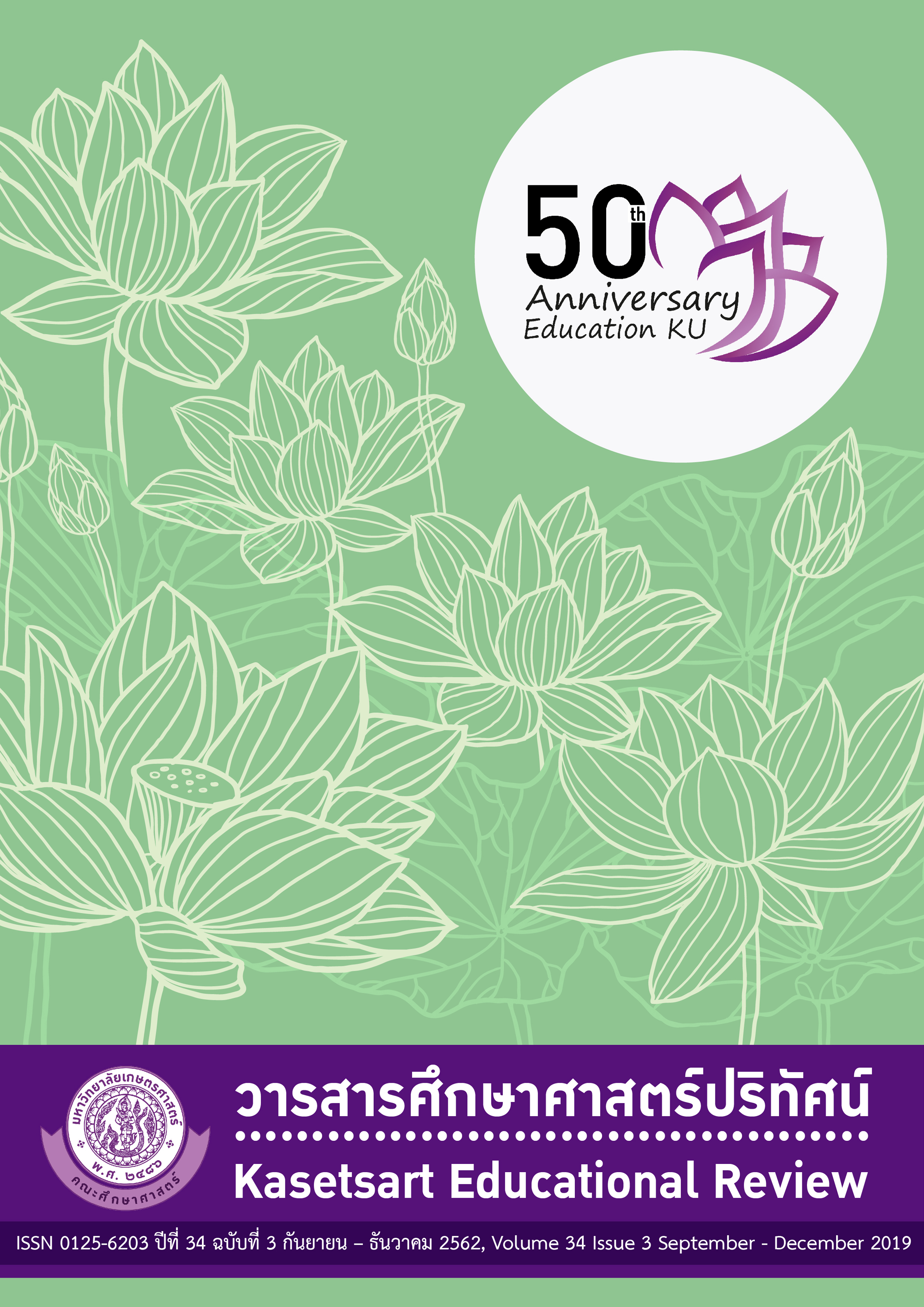การพัฒนาทักษะการอภิปรายโต้แย้ง เรื่อง สารชีวโมเลกุล ของนักเรียนชั้นมัธยมศึกษาปีที่ 4 ผ่านการจัดการเรียนรู้โดยบริบทเป็นฐาน
คำสำคัญ:
ทักษะการอภิปรายโต้แย้ง, การจัดการเรียนรู้โดยใช้บริบทเป็นฐาน, สารชีวโมเลกุลบทคัดย่อ
การวิจัยนี้เป็นการวิจัยเชิงปฎิบัติการในชั้นเรียน มีจุดประสงค์เพื่อศึกษาแนวทางการจัดการเรียนรู้ เรื่อง สารชีวโมเลกุล โดยใช้บริบทเป็นฐาน และพัฒนาทักษะการอภิปรายโต้แย้งของนักเรียนชั้นมัธยมศึกษาปีที่ 4 จำนวน 30 คน ห้องเรียนพิเศษวิทยาศาสตร์ ข้อมูลแนวทางการจัดการเรียนรู้เก็บข้อมูลจากแบบบันทึกหลังการจัดการเรียนรู้ของครูผู้สอน และทำการวิเคราะห์เนื้อหา และเก็บรวบรวมข้อมูลทักษะการอภิปรายโต้แย้งจากแบบวัดทักษะการอภิปรายโต้แย้งและทำการวิเคราะห์โดยจัดกลุ่มคำตอบเป็น 5 ระดับ หาค่าเฉลี่ยระดับทักษะการอภิปรายโต้แย้งทางวิทยาศาสตร์ของนักเรียนก่อนและหลังได้รับการจัดการเรียนรู้
ผลการศึกษา พบว่า แนวทางในการจัดการเรียนรู้โดยใช้บริบทเป็นฐานเพื่อพัฒนาทักษะการอภิปรายโต้แย้งควรมีลักษณะดังนี้ 1) ขั้นกำหนดสถานการณ์เป็นขั้นที่ควรให้นักเรียนแสดงข้อกล่าวอ้าง จากนั้นให้นักเรียนพัฒนา 3 องค์ประกอบ ได้แก่ เหตุผลสนับสนุนข้อกล่าวอ้าง หลักฐานสนับสนุนข้อกล่าวอ้างและเหตุผลข้อโต้แย้งฝ่ายตรงข้าม ในขั้นลงมือปฏิบัติและขั้นเรียนรู้แนวคิดสำคัญ 2) ควรใช้สถานการณ์ใกล้ตัวและเป็นที่สนใจของนักเรียน เช่น เรื่องการดูแลสุขภาพและความงาม และพฤติกรรมการบริโภคของนักเรียนและควรหลีกเลี่ยงสถานการณ์ที่นักเรียนมีความรู้วิทยาศาสตร์ที่ถูกต้องอยู่แล้วหรือสถานการณ์ที่เกี่ยวกับคุณธรรมและจริยธรรมที่ทำให้เกิดการโน้มเอียงทางความคิด 3) ควรให้นักเรียนลงมือปฏิบัติกิจกรรมและอภิปรายจนเกิดการเรียนรู้แนวคิดสำคัญ
นอกจากนี้ยังพบว่า ร้อยละ 66.66 ของนักเรียนมีทักษะการอภิปรายโต้แย้งทางวิทยาศาสตร์พัฒนาขึ้นกว่าก่อนเรียน นักเรียนส่วนใหญ่มีทักษะการอภิปรายโต้แย้งเพิ่มขึ้นจากระดับที่ 4 เป็นระดับที่ 5 โดยองค์ประกอบที่สามารถพัฒนาเพิ่มขึ้นมากที่สุดคือ ข้อโต้แย้งกลับ และองค์ประกอบที่ยังคงต้องพัฒนาเพิ่มเติม คือ หลักฐานสนับสนุนข้อกล่าวอ้าง
เอกสารอ้างอิง
Acara, O., Turkmen,L. & Roychoudhury, A. (2010). Student difficulties in socio-scientific argumentation and decision-making research findings: Crossing the borders of two research lines. International Journal of Science Education, 32(9), 1191-1206.
Driver, R., Newton, P. & Osborne, J. (2000). Establishing the norms of scientific argumentation in classrooms. Science Education, 84(3), 287–312
Gilbert, J. K. (2006). On the nature of “context” in chemical education. International Journal of Science Education, 28(9), 957-976.
Lin, S. S. & Mintzes, J. J. (2010). Learning argumentation skills through instruction in socioscientific issue: The effect of ability level. International Journal of Science and Mathematics Education,8(6), 993-1018.
Lubben, F. Sadeck, M., Scholtz., Z. and M. Braund. (2010). “Gauging Students’ Untutored Ability in Argumentation about Experimental Data: A South African case study.” International Journal of Science Education,32(16), 2143-2166.
Osborne, J., Erduran, S. & Simon, S. (2004). Enhancing the quality of argumentation in school science. Journal of Research in Science Teaching,41, 994–1020.
Zohar, A. & Nemet, F. (2002a). Fostering students’ knowledge and argumentation skills through dilemmas in human genetics. Journal of Research in Science Teaching, 3(1), 35–62.
Zohar, A. & Nemet, F. (2002b). Fostering students’ knowledge and argumentation skills through dilemmas in human genetics. Journal of Research in Science Teaching, 39 (1), 35–62.Cited in Means, L. M., & Voss, J. F. (1996). Who reasons well? Two studies of informal reasoning among children of different grade, ability, and knowledge levels. Cognition and Instruction, 14(2), 139-178.
Bunyathachanee, P. (2015). The development of argumentation skills on force and law of motion of grade 10 students using context-based learning (Master’s Thesis). Bangkok: Kasetsart University. [in Thai].
Dokmai, P. (2012). Comparisons of effects of learning socioscientific issues using the mixed method and the conventional learning method on argumentation and logical thinking abilities of mathayomsuksa 5 students with different physics learning outcomes (Master’s Thesis). Mahasarakham: Mahasarakham University. [in Thai].
Kanjanawasee, S. (2013). Classical test theory (7th ed.). Bangkok: The Publisher of Chulalongkorn University. [in Thai].
Sreethunyoo, A. (2012). Context-based learning in chemistry. Kasetsart Educational Review,27(2), 33-47. [in Thai].
Wongwanich, S. (2012). Classroom action research (16th ed.). Bangkok: The Publisher of Chulalongkorn University. as cited in Kemmis, S. (1998). Action research. Oxford: Pergamon Press. [in Thai].
ดาวน์โหลด
เผยแพร่แล้ว
ฉบับ
ประเภทบทความ
สัญญาอนุญาต
บทความทุกบทความเป็นลิขสิทธิ์ของวารสารคณะศึกษาศาสตร์ มหาวิทยาลัยเกษตรศาสตร์ วิทยาเขตบางเขน
วารสารศึกษาศาสตร์ปริทัศน์ (Kasetsart Educational Review)






